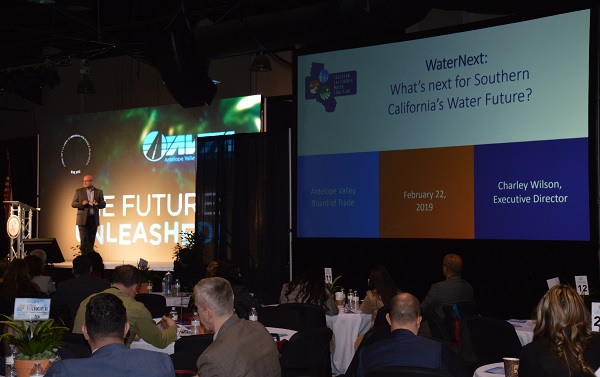No matter where you look in Southern California, you find agencies and others developing innovative solutions to the water issues that affect us all. It’s easier to find common ground between us than it seems sometimes. We all understand the importance of water to Southern California’s economic growth, and we all want to work to find solutions to the problems that have plagued us for decades.
Good rainfall throughout the state has helped to alleviate water worries this year. Severe and mandatory water restrictions have faded from our rearview mirror. But the specter of future droughts is still very much with us and experts say it’s likely to remain a more or less permanent feature of our lives.
William Patzert, the Caltech oceanographer and climatologist, has said that Southern California has historically experienced 10-year drought cycles. Looking far back to ancient times, B. Lynn Ingram, the UC Berkeley paleoclimatologist, has found evidence of “megadroughts” in the American West that indicate that the 20th century was a relatively wet time in the region’s climate. Between 900 and 1400 A.D. the American West experienced century-long droughts. Now, climatology is a science but it’s not an exact one, so we cannot look at evidence of megadroughts in ancient times and conclude that they will soon be a reality. But what we can take away as a bottom line is that dry years are the norm for California.
We all hope that the wet weather will continue. But the sheer unpredictability of our future water supplies also means that we need to prepare for more years of drought.
At the Southern California Water Coalition, our main job is educating and advocating to ensure secure and reliable water supplies for the future. We do this by providing a unique forum for collaboration and consensus-building among the region’s cities, counties, water agencies, farmers, manufacturers, utilities, labor unions, businesses and more.
To us, prioritizing a secure water future means supporting what we call an “all-of-the-above” approach for a balanced water portfolio. This means advocating for regional and local supply projects and serving as a champion for critical projects like the proposed Delta Conveyance project— a project that upgrades and modernizes our primary water delivery system to secure a reliable and affordable water supply for California, ensuring economic growth. Because the fact remains, without a baseline supply of water, local supply projects like water recycling and groundwater recharge would not be possible.
Southern California is leading the way in local water supply development and conservation. Projects like stormwater capture, water recycling, groundwater cleanup, desalination and conservation and efficiency programs all must work hand-in-hand to make the most out of every drop of water we have available to us. Continued investment in these projects in addition to California WaterFix is more important than ever as the region prepares for population growth, ongoing drought and other threats to supplies amidst climate change.
Living and working in a dry place like Southern California means we must be part of the solution to the state’s water issues and ensure the state’s economic growth. Whether it’s conserving water at home, publicly supporting the momentum behind Governor Newsom’s proposed single-tunnel Delta conveyance solution, voting yes on ballot measures that fund local projects such as stormwater capture, or helping find new solutions and new ways of thinking about water supply and use, we must change how we take water for granted. The new normal foreseen by researchers and planners must be matched by a new way of thinking about water supply. We owe that to future generations.
Charles Wilson
Executive Director
Southern California Water Coalition
